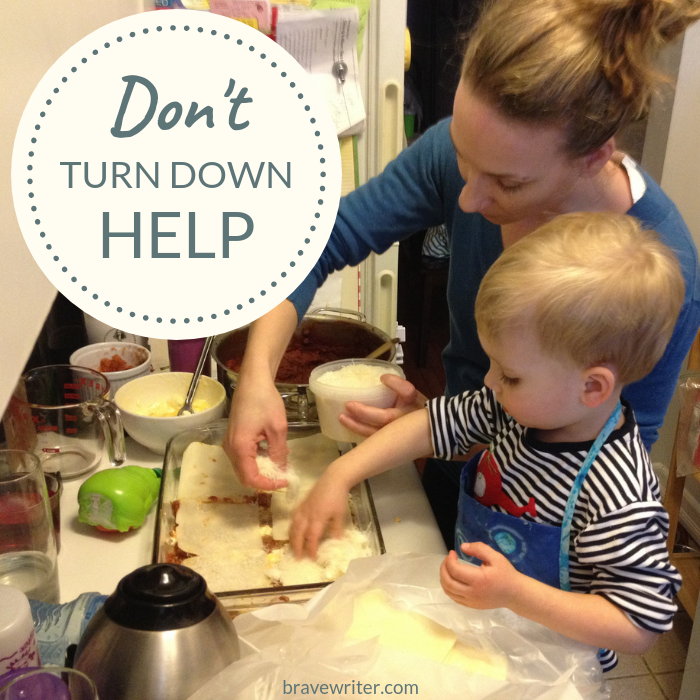Are You Training Your Kids to NOT Help?

Do you wish you didn’t have to ask your family for help?
- with the dishes
- taking out the over-flowing garbage
- changing the toilet paper tube (why this is difficult, I still don’t understand)
- clearing a table
- putting away the dozens of pairs of mis-matched shoes strewn through the halls
- moving a wet load of laundry to the dryer and a new load into the washer
- shoveling snow
- unloading groceries
- replenishing the food and water bowls for the dog and cats
And so on…
Let me flip this around on you. What do you do when someone offers to help?
Think about it for a moment. Imagine this setting. You’re in the kitchen unloading the dishwasher and preparing to load it. In a surprising instance of charity and awareness, your teenager who is watching TV says, “Do you need help Mom?”
What do you say?
Do you tell the teen that yes, you need help, and that he can turn off his favorite program to take over for you at the sink? Do you do then walk away leaving him to it while you go get a bubble bath or hop back onto the computer?
Or do you think to yourself, “That’s so nice that he asked, I’m going to reward him by saying he doesn’t have to help me and he can go on watching his program”? Some unconscious version of this one—you turn down help because you feel generous when you do.
Another instance: You’re folding laundry and the five year old wants to help. The five year old will offer five year old skills to the job. Do you accept that? Or do you send the child away to play so you can get it done correctly and quickly?
Another time: You’re making dinner and it’s the favorite meal of your 11 year old daughter. She offers to peel or chop and you send her to set the table. She doesn’t particularly want to set the table—she wanted to help by peeling and chopping. You know she will slow you down if she peels and chops so you ask her to do what feels helpful to you: setting the table. She does a poor job with the table and you feel resentful that she isn’t being helpful… perhaps.
If any of these resonate—take a moment to consider this idea.
When you turn down help (whether you do so out of a desire to be generous, or because you are better at it, or because the offer doesn’t match what you thought you needed), you train your family to NOT HELP you.
In other words—if you want helpers in your family, accept the help they offer with enthusiasm, support them in being helpful by teaching them the skill that they want to offer, and if they are capable of doing the task without you, walk away and let them do the whole job so that they see they were helpful (not merely supervised and scolded). Let them see that you are relaxing and enjoying the help they are giving you.
It’s not easy.
It’s a reflex to simply take over, move quickly, do what needs to be done, and leave everyone in the status quo space of not helping.
Then what happens? Resentment builds. We start believing that no one cares about us, when in fact, we may have trained our roommates to let us do everything for them!
How do you get back to offers of help if you’ve already extinguished them? You ask for help! You say things like, “Who wants to help me make dinner? I’ve got sharp knives and electric tools for anyone who wants to hang out in the kitchen with me. I’ll set the table while you frappe and slice.”
You ask for help like this:
“I’m exhausted. Anyone willing to do the dishes for me tonight? I will be eternally grateful. I just need one hour to unwind in a tub? Anyone? Anyone?”
If no one offers, you do them and keep going and ask again another night. Over time, your vulnerability in needing help will reappear on the radar. Someone (one of your kids) will recognize that he or she can actually make you happy by helping (not make you worried or annoyed). And that child will offer, freely, out of the blue.
People want to be helpful. Sometimes we train them to lose that desire.
We can turn it around.
Principles:
- Always accept the help being offered (don’t change the offer to something else).
- Help your helpers be helpful—give them lessons, show them how, appreciate their efforts.
- Get out of the way—competent helpers should be left to help, not hovered over. You should benefit from the help by not being there, doing something else you enjoy.
- Thank them. Not effusively, but genuinely. “Thank you for cleaning up. That was helpful.”
Go forth and be helped!
Top image by Paul Ashley (cc cropped, text added)


















